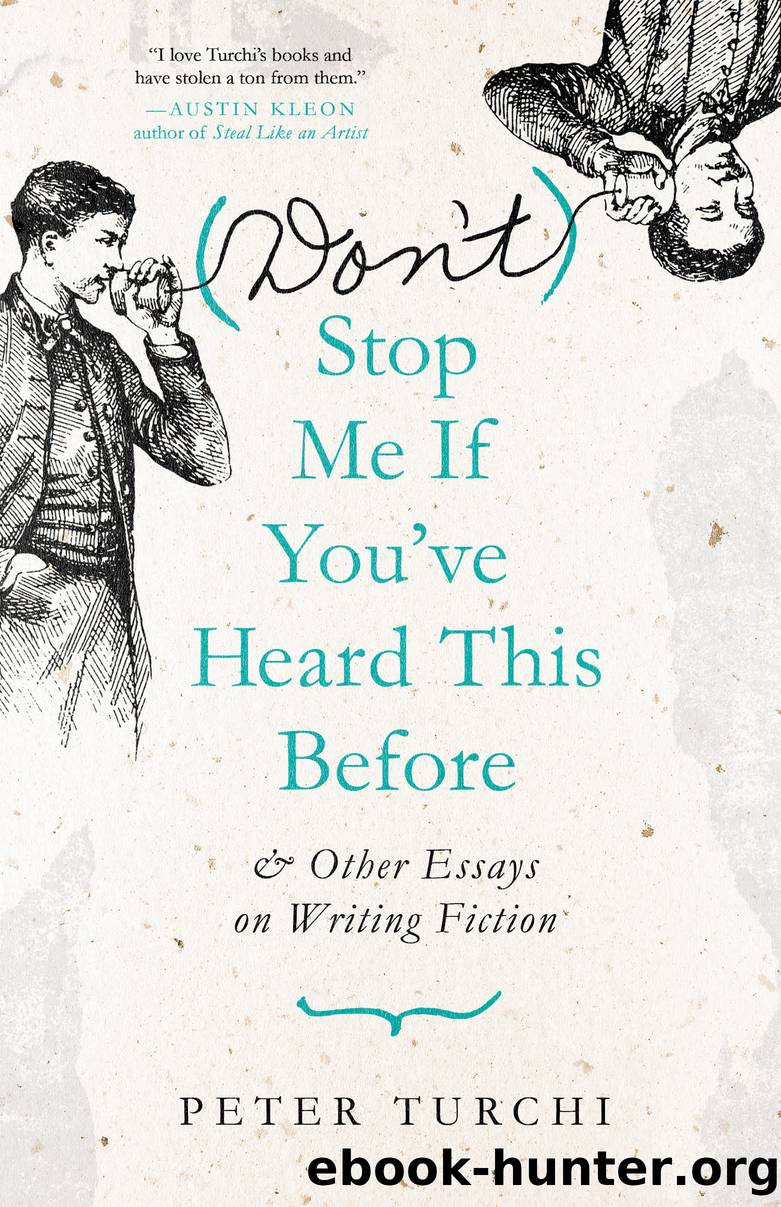(Don't) Stop Me if You've Heard This Before: and Other Essays on Writing Fiction by Peter Turchi

Author:Peter Turchi
Language: eng
Format: epub
Publisher: Trinity University Press
THE UNNAMED NARRATOR OF Yoko Ogawaâs The Memory Police is less assertive and less violent than Janina, but she is, in her way, every bit as disturbing. This narrator is no murderer; rather, sheâs one of many victims of an authoritarian state on an unnamed and inescapable island. At the outset she tells us that for as long as she can remember things have disappeared, vanished. Weâre encouraged to interpret this broadly: she recalls her (disappeared) mother telling her, âIt wonât be long now ⦠Something will disappear from your life.â We canât help but agree. But on the narratorâs island, the things that disappearâthat are essentially destroyed, erased, or eliminatedâinclude ribbons, bells, perfume, birds and, eventually, roses, photographs, fruits, books, and body parts. By novelâs end, the narrator is reduced to a voice, and even that is fading.
While the narrator is certainly disturbed by these losses, and while she takes great risks to protect one friend and investigate the disappearance of another, ultimately she seems passive, helpless. Sheâs a writer, and over the course of the novel we read excerpts from her work in progress, the story of a typist who is seduced by her teacher, held captive in a tower, and rendered voiceless. That character, whom we associate with the narrator, says that while her captor has done âtruly horrible things ⦠I canât help feeling a kind of gratitude.â One day, when sheâs alone in the tower, another typing student, a young woman, knocks at the door, providing a chance to escape. But instead the character stays silent. âHow can you explain this?â she thinks. âAnd even if she did help you, do you really believe youâd get back all the things youâve lost?â That night, her captor says, âI knew that you were no longer capable of going back out into the world.â She realizes that she is being replaced by the other young woman, and that they are two in a long line; but instead of expressing anger, she says sheâs disappointed: âWhy doesnât he realize that my voice, my body, my sensations, my emotionsâeverything exists only for him.â Soon after that final installment of the novel within a novel, our narrator tells us that she and âthe citizens of the island had lost everything that had a form, and our voices alone drifted aimlessly.â
In contrast to Lolita and Drive Your Plow over the Bones of the Dead, The Memory Police provokes us because of what the character suffers, and because of what she doesnât do. Unlike Humbert Humbert and Janina, she doesnât seem compelled to justify herself; sheâs simply recounting what happened. We can read the book as a more abstracted and fantastic version of the effects of a totalitarian state than, say, Orwellâs 1984; we can read it as a story of psychological and sexual abuse leading to something like Stockholm syndrome; we can read it as an illustration of the dangers of forgetting the past and failing to act to prevent its
Download
This site does not store any files on its server. We only index and link to content provided by other sites. Please contact the content providers to delete copyright contents if any and email us, we'll remove relevant links or contents immediately.
| Diaries & Journals | Essays |
| Letters | Speeches |
The Rules Do Not Apply by Ariel Levy(4946)
Bluets by Maggie Nelson(4541)
Too Much and Not the Mood by Durga Chew-Bose(4324)
Pre-Suasion: A Revolutionary Way to Influence and Persuade by Robert Cialdini(4204)
The Motorcycle Diaries by Ernesto Che Guevara(4078)
Walking by Henry David Thoreau(3946)
Schaum's Quick Guide to Writing Great Short Stories by Margaret Lucke(3368)
What If This Were Enough? by Heather Havrilesky(3300)
The Daily Stoic by Holiday Ryan & Hanselman Stephen(3292)
The Day I Stopped Drinking Milk by Sudha Murty(3183)
The Social Psychology of Inequality by Unknown(3011)
Why I Write by George Orwell(2941)
Letters From a Stoic by Seneca(2783)
A Short History of Nearly Everything by Bryson Bill(2679)
A Burst of Light by Audre Lorde(2586)
Insomniac City by Bill Hayes(2535)
Feel Free by Zadie Smith(2472)
Upstream by Mary Oliver(2382)
Miami by Joan Didion(2362)
